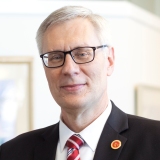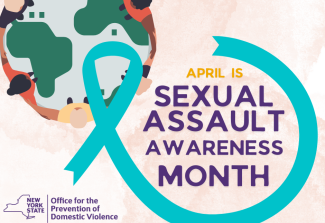Staff, Faculty Serve Key Role in Keeping Campus Tested, Safe
Pooled surveillance testing for COVID-19 is a key component to keeping the SUNY Plattsburgh campus safe this spring, and the college's faculty and staff volunteers are a critical part fueling that effort.
With weekly testing required for all members of the college community this semester, there grew a need to support all stations of the operation in the former Algonquin Dining Hall. Roles from greeting people at the door to packaging the pooled swabs for transport to SUNY Upstate Medical University in Syracuse, where they are tested for the coronavirus, are required.
Enter more than 140 volunteer staff and faculty who fill shifts from half to full days each week to keep the campus community safe. These include President Alex Enyedi and his wife, Andrea. All told, more than 3,000 tests are conducted each week. The volunteers are supplemented by paid student workers, who help in various capacities.
 "Weekly testing of all students, faculty and staff has been driven by a dedicated
group of volunteers from the across the campus,” Enyedi said. “I am so proud of the
volunteers who are contributing to this effort and pitching in to keep our community
safe. Cardinals care for one another, and this is another example of this in action.
Because of their volunteerism, we are able to do this important work, testing the
campus over three days each week.”
"Weekly testing of all students, faculty and staff has been driven by a dedicated
group of volunteers from the across the campus,” Enyedi said. “I am so proud of the
volunteers who are contributing to this effort and pitching in to keep our community
safe. Cardinals care for one another, and this is another example of this in action.
Because of their volunteerism, we are able to do this important work, testing the
campus over three days each week.”
'Nice to Know I Can Help Out'
Beyond pooled testing, dozens of faculty and staff volunteer to help students who are in quarantine or isolation because of COVID, serving as "buddies" and providing daily check-ins.
James Sherman, assistant director of community living, said he feels it’s his “duty to help where I can.”
“Much of this pandemic has many of us — myself included — wondering how we can help,” he said. “Though volunteering for pooled testing is a small contribution in the scheme of things, it’s still nice to know that I can help out.”
At the testing center, greeters assist students, faculty and staff as they navigate the pooled testing login, direct them where to go if they are testing in person or where to leave their sealed swabs for those faculty and staff who test at home.
Attendants give testers their swabs, instruct on the proper technique and then collect the vials in groups of 12. Tech assistants collect vials and prepare for the daily shipping retrieval.
'I Really Wanted to Do Something'
“The pandemic has been so disruptive to our way of life,” said Dr. Richard Gottschall, associate professor of marketing and entrepreneurship, who was volunteering on a recent afternoon at a swabbing station.
“I’ve watched movies and documentaries and read fiction and non-fiction books about past and imagined pandemics. I have experienced quarantine and isolation and working from home with my wife and kids. I guess I thought of volunteering as another opportunity to participate in, and experience, what I hope is a once-in-a-lifetime event.”
It’s also been a way to give back, Gottschall said.
“I am surprised and grateful that I have been able to keep working and be paid while doing my job in what I consider to be very safe conditions,” he said. “I know many who have not been so fortunate. While there are many things people are doing to keep the campus running smoothly, I really wanted to do something directly related to the health emergency.”
Barbara Criss, whose husband, Dr. Dexter Criss is associate professor of chemistry,
volunteers at the pooled testing center as often as she is needed. With her songs
she sings to help students feel more welcome, she is proud and honored to have the
opportunity to volunteer and sees it as a chance to make the community better.
“I watch the BBC news, and they talk about the pandemic all over the world. People are still suffering. People are watching us,” she said “I want them to know that mothers, daddies, sisters, brothers and grandparents do not have to worry about their kids’ safety (at SUNY Plattsburgh) as long as they are doing what they need to do, including wearing masks, washing their hands frequently and obeying social distancing.”
'If Not Me, Then Who?'
Dr. M.E. “Doc” Sheehan, lecturer in biology, is a doorway greeter. Wearing a whimsical horned monster hat, he instructs students how to call up the login on their phones and brings them in three at a time to avoid crowding. He’s there, he said, because “If not me, then who?”
“If the way to lead is by example, then I’m here doing it,” Sheehan said. “I learned
a philosophy long ago, which is to kill the monster when it is tiny. By testing and
isolating cases quickly, we have managed this well. But that won’t happen without
boots on the ground. By participating in this, I’m contributing to the safety of the
entire community — myself and my wife included.”
Sherman echoed that, saying how pooled testing “really serves as a preventive measure (because) it really helps the campus identify the virus before it spreads.”
“It’s a lot easier to put out a small fire that you’re aware of than to be taken by surprise by a fire that has grown out of our control. By identifying small pockets earlier, we are able to help those with the virus faster, hence stopping it from spreading out of control,” Sherman said. “This pandemic was never going to be solved by the individuals in charge; it needs a collective effort. So I believe it is my duty to contribute to that effort.”
For more information on campus COVID efforts, visit the regularly updated dashboard here: https://www.plattsburgh.edu/covid-19/index.html.
News

SUNY Recognizes Two Plattsburgh Seniors for Excellence in Academics, Leadership

Sexual Assault Awareness Month Events Planned Throughout April
‘Day of Visibility’ Recognizes, Highlights Members of Transgender Community
SBE Teams with CVPH Medical Center to Train Management Personnel
